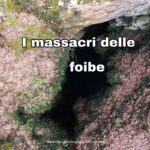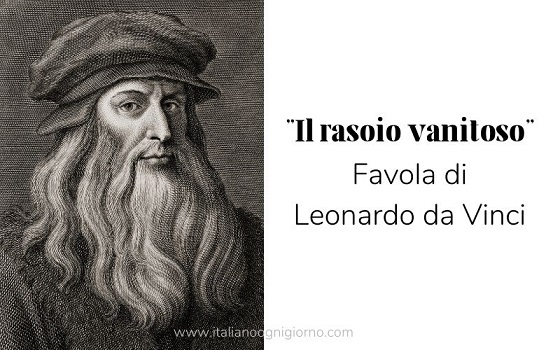Sai, che Leonardo da Vinci tra un’invenzione e l’altra scriveva anche favole? Non c’è da stupirsi ovviamente! Anche perché la favola ha un’ origine popolare antichissima e ha preceduto qualsiasi forma letteraria. La parola “favola”, viene dal latino “fabula”, e significa parlare. Infatti, le favole avevano il ruolo di trasmettere in forma orale, la tradizione, i principi e i valori della società. Pertanto, non era destinata all’educazione dei bambini, ma a dare un significato e fornire riposte agli episodi della vita quotidiana.
Leonardo trasmette con questa favola l’importanza di allenare sempre la propria mente come faceva lui!
IL RASOIO VANITOSO
Un giorno il rasoio uscì dal suo manico e si mise a prendere il Sole. Vedendo il Sole che si specchiava sul metallo lucido, il rasoio si riempì d’orgoglio e disse: “Come sono bello: perfino il Sole si specchia su di me. Eppure devo faticare ogni giorno; sono proprio stufo di tagliare barbe. Anzi, sapete cosa faccio? Me ne vado. E non tornerò più alla bottega del barbiere. Mi nasconderò e mi godrò in pace la mia bella vita”.
Il rasoio fuggì lontano dalla bottega e si nascose in una grotta, per non essere trovato dal barbiere. Rimase lì per qualche mese, poi uscì dalla grotta e si mise al Sole ma questo non si specchiava più sulla sua lama: il rasoio aveva perso la sua lama ed era coperto di ruggine da cima a fondo.
Disperato, si lamentò: “Ah, se solo fossi rimasto alla bottega del barbiere. Avrei dovuto continuare a tagliar barbe, così sarei rimasto ben affilato e lucente; adesso sono solo un ferro vecchio da buttare”.
Questo è quel che accade a chi smette di studiare e di esercitarsi e si dà al divertimento: la sua mente, come il ferro, perde filo e lucentezza e si copre della ruggine dell’ignoranza.
(English translation)
Did you know that Leonardo da Vinci also wrote fables between one invention and another? Nothing to be surprised about of course! Also because the fable has a very ancient popular origin and preceded any literary form. The word “favola” (fable) comes from the Latin word “fabula”, and means to speak. In fact, fable had the role of transmitting the tradition, principles and values of society in oral form. Therefore, it was not intended for the education of children, but to give meaning and providing answers to events of everyday life.
Leonardo transmits with this fable the importance of always training one’s mind as he did!
THE VAIN RAZOR
One day the razor came out of its handle and began to bask in the sun. Seeing the sun reflected in the shiny metal, the razor was filled with pride and said: “How beautiful I am: even the sun is reflected on me. Yet I have to toil every day; I’m just sick of trimming beards. Actually, you know what I’m going to do? I’m leaving. And I’ll never go back to the barbershop. I’ll hide away and enjoy my beautiful life in peace.”
The razor fled away from the shop and hid in a cave, not to be found by the barber. He stayed there for a few months, then he came out of the cave and put himself in the sun, but it no longer reflected on his blade: the razor had lost its blade and was covered in rust from top to bottom.
Desperate, he moaned, “Ah, if only I’d stayed at the barbershop. I should have kept trimming beards, so I would have remained sharp and shiny; now I’m just an old piece of iron to throw away”.
This is what happens to those who stop studying and practicing and just want to have fun: their mind, like iron, loses its edge and shine, and is covered with the rust of ignorance.
- Il Discorso diretto e discorso indiretto in italiano

- I massacri delle foibe – Il Giorno del Ricordo

- Un racconto di Natale: Il Tesoro dei Poveri di Gabriele D’Annunzio

- Estate di San Martino- leggenda e tradizioni

- I verbi fraseologici: venire/andare a prendere

- Michela Murgia: tenace scrittrice e attivista italiana

- I Vini italiani |Storia e Cultura

- Come diventare migliori comunicatori in italiano


